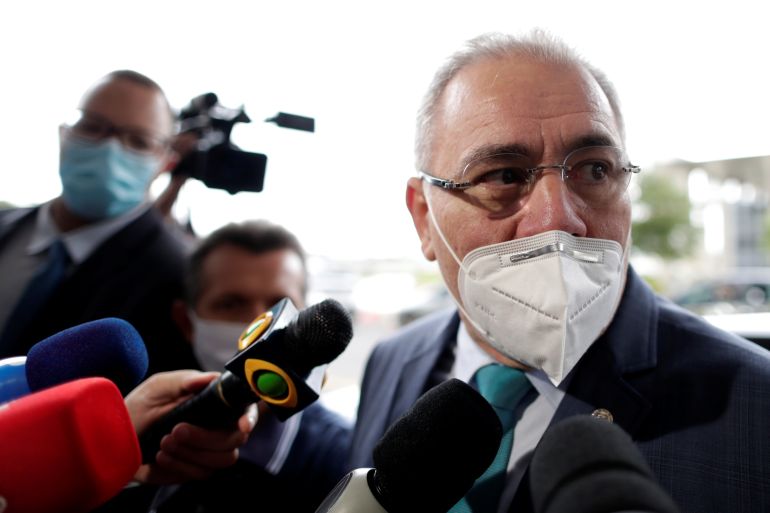Brazil’s next health minister says he will follow Bolsonaro plan
Brazil’s President Jair Bolsonaro is under pressure for his handling of the COVID-19 pandemic as cases and deaths surge.

Brazil’s next health minister – the country’s fourth since the start of the COVID-19 pandemic – has said he intends to continue the work of his predecessor in implementing far-right President Jair Bolsonaro’s policies.
Bolsonaro, who faces mounting pressure and public anger over his government’s handling of the crisis, announced on Monday that cardiologist Dr Marcelo Queiroga would take up the post of health minister.
Keep reading
list of 3 itemsLula receives COVID jab as Brazil’s coronavirus crisis continues
What next in Brazil after Lula’s corruption convictions annulled?
Brazil has seen a surge in coronavirus cases and deaths in recent weeks, as the health ministry said on Tuesday that 2,841 additional deaths were reported in the past 24 hours – a new single-day record – along with 83,926 new infections.
Brazil has reported 11.5 million COVID-19 cases and more than 279,000 people deaths to date, according to Johns Hopkins University data – the second-highest totals in the world.
Queiroga will succeed Eduardo Pazuello, a general who had been criticised for lacking any public health experience and overseeing the crisis.
“Minister Pazuello has been working hard to improve health conditions in Brazil and I was called upon by President Bolsonaro to continue this work,” Queiroga said on Tuesday, as he arrived for his first meeting at the ministry.
He said the minister is there to implement health policies set by the president.
Queiroga is expected to be formally appointed to the position on Wednesday, but he has already met with Pazuello to begin discussing the transition.
Queiroga has also said that lockdowns are not the way to get the surging pandemic under control, echoing Bolsonaro, who has eschewed public health restrictions despite calls from local and regional leaders for stricter measures.
The governor of Sao Paulo state, for instance, imposed a two-week lockdown this month in an effort to curb the potential spread of the virus, despite threats to cut federal funding.
The lockdowns have prompted some Brazilians to protest in recent days.
Meanwhile, Pazuello said on Monday that Brazil had ordered 100 million doses of the Pfizer-BioNTech vaccine and 38 million from Johnson & Johnson, while it is negotiating for 13 million doses of Moderna Inc’s vaccine.
Bolsonaro also said this week that Brazil is “moving into a more aggressive phase in the fight against the virus”.
Geraldo Monteiro, a political scientist at Rio de Janeiro State University, said despite his recent comments, Bolsonaro’s convictions remain the same.
“It’s more of a strategic retreat due to by pressure from some of his political allies, notably in parliament, because the pandemic is out of control,” Monteiro told the AFP news agency.
That pressure has increased since a Brazilian Supreme Court judge last week annulled corruption convictions against left-wing former president Luiz Inacio Lula da Silva, opening the door for him to run in presidential elections next year.
Lula, who received a COVID-19 jab over the weekend, has slammed Bolsonaro for the surge in coronavirus-related deaths and infections.
“Do not follow that imbecile,” he told his supporters last week.
A recent poll showed that 61 percent of Brazilians disapprove of Bolsonaro’s handling of the crisis, AFP said.
“The hope of a change, of course, lies in electoral pressure, the only thing that has an effect on Bolsonaro,” read an editorial in the daily newspaper O Estado de S Paulo on Tuesday.